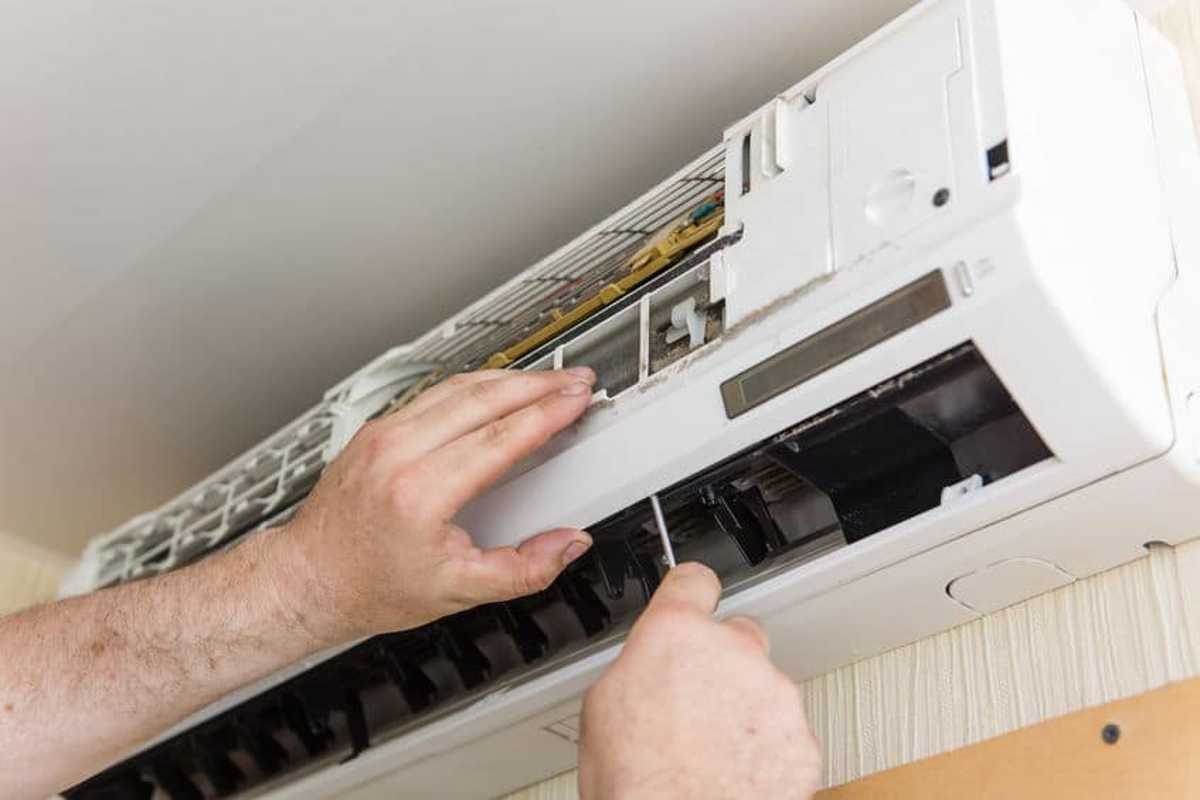Central air conditioning is essential for any modern-day home. This modern convenience is often taken for granted. However, it is almost solely responsible for your family’s comfort in any season and climate. Not only can it regulate temperature, but it also monitors and alters the humidity in your home. If you’ve ever wondered what central air is or some details about it, this comprehensive guide will teach you everything you need to know! 
How Does Central Air Conditioning Work?
First, let’s start with the basics: central air conditioning is a type of HVAC (heating, ventilation, and air conditioning) system that involves several components working together to keep your home cool and comfortable. It cools your home by removing heat and humidity from the indoor air using outdoor and indoor components. The air is cooled in a single location and distributed evenly throughout the house. This system cools the entire house to a single temperature, rather than other systems like window units, ductless mini-splits, or room air conditioners that alter the temperature of the immediate area around them.
What Makes Up a Central Air Conditioning System?
1. The Outdoor Unit
The outdoor unit of a central air conditioning system contains the condenser, compressor, and fan. The condenser is a large metal box containing refrigerant coils, which are eventually compressed and circulated throughout the system by the compressor. The fan draws air over the coils, which cools the refrigerant and expels the excess heat outdoors.
2. The Indoor Unit
The indoor unit of a central air system includes the evaporator, air handler, and ductwork. The evaporator is responsible for absorbing the heat and moisture from the indoor air. The air handler is a fan that blows cooled air through the ductwork, a network of pipes and vents that distribute the cooled air evenly into the various rooms of your home.
3. The Refrigerant
Refrigerant is the main chemical that circulates throughout your central air system. It absorbs heat from the indoor air and evaporates through the evaporator coil, turning it into a gas. This gas is compressed and circulated through the outdoor system, where the heat is released outdoors. When the heat is removed, the refrigerant condenses back into a liquid and restarts the process of cooling your home.
4. The Thermostat
The final component of the central air system is the one you’re likely the most familiar with – the thermostat. The thermostat is the user interface of your AC unit and is responsible for controlling the temperature in your home. It allows you to turn it on and off, adjust the temperature, and what settings you prefer. Modern or smart thermostats can be programmed to automatically adjust the temperature based on your schedule, which helps to save energy and reduce your bills!
The Different Types of HVAC Systems
There are two main types of central air systems, a split system and a packaged unit. Split-system air conditioners are the most common type of centralized system. They contain both indoor and outdoor units connected by the refrigerant line. Split systems are available in single-zone and multi-zone configurations, ideal for multi-story homes.
Packaged air conditioners are an excellent choice for smaller homes. Instead of having separate indoor and outdoor units, all of their components are housed in a single unit. They take up less space than split systems, as the unit is placed on the roof or a concrete slab on the ground level adjacent to the home. These units often include electric heating coils or a natural gas furnace, eliminating an indoor heating unit from occupying more space in your home.
How To Choose a Central Air Conditioning System? 
An HVAC system is one of a homeowner’s most expensive purchases. This makes it a daunting task, especially as few people are well-versed in all options. If you’re choosing an air conditioning system, here are several factors to consider.
1. How Big Is It?
The size of an AC unit is a critical factor when choosing the right system. If your system is too small for your home, it will run constantly and inefficiently, causing your bills to skyrocket. A unit that is too big for your home will cool too quickly and shut down before completing a complete cycle without removing the humidity from the space. It will be more expensive to run and not cool your home correctly. The right size AC unit will cool your home efficiently and shut off after one complete cycle. If you need more clarification about the size of your new unit, consult a heating and cooling professional. An expert can look at your system and home and determine the best option for your needs and budget.
2. What Are Its Functionality and Features?
Your thermostat primarily controls the functionality of your system. You may want a system that integrates with your phone, a virtual voice assistant, or automatically changes the temperature based on a schedule. You can consider other smart technologies such as motion sensors, remote temperature sensors, and error diagnosis. Smart features are an investment. They increase the functionality of your system while saving energy and utility costs. However, they come with an increased price tag compared to a basic design.
3. Is It Efficient?
It is easy to determine an AC unit’s potential efficiency. Each system gets a SEER rating (seasonal energy efficiency ratio). The higher the SEER rating, the more efficient the unit is. However, this rating can fluctuate slightly due to climate and usage conditions.
Common Problems with AC Units
HVAC units are almost in constant use and, like any home appliance, can need repairs occasionally. Here are a few of the most common problems central air systems face.
1. Refrigerant Is Low or Leaking
If your AC system isn’t cooling the house properly, chances are you have a problem with your refrigerant. It is the substance that cools the air in your AC unit, so your home won’t get any colder when it is out. Leaking refrigerant can also harm the environment, so calling an HVAC professional as soon as possible is essential. 
2. Clean or Replace Filters
Dirty filters are one of the most frequent HVAC problems homeowners can encounter. Filters trap dirt, dust, and other particles to keep clean air flowing through your home. They can become clogged, causing your system to work harder than necessary, leading to higher energy bills and damage to the unit. Luckily, this is a simple fix – regularly cleaning and changing your filters is an easy task almost any homeowner can accomplish without professional assistance.
3. Electrical Issues
Every AC unit runs on electricity. If your HVAC has electrical problems, it can cause erratic cycling, poor cooling, an inability to turn on or off, and many more issues. This can result from faulty wiring, a malfunctioning thermostat, a blown fuse, or more dangerous causes. Call a professional immediately if you smell a burning odor coming from your unit.
4. Frozen Evaporator Coils
The evaporator coils in your unit absorb the heat from the air, allowing your home to cool down. However, if these coils become too cold and freeze, they can cause the unit to seize and stop working. If you see ice forming on your unit, it is time to give it a rest and call a professional.
5. Fan Problems or Replacements
Your AC fan helps circulate air through the system. If it isn’t working, you may have a dead capacitator or need to replace the motor. If your fan isn’t working, it won’t cool your unit correctly and can cause many other issues. If your fan has stopped working, turn your unit off and contact a professional.
When To Repair or Replace Your AC Unit?
Like any machinery, AC units cannot last forever. The typical lifespan of a central air conditioning system is between 15 and 20 years. However, every homeowner has a different experience. This largely depends on how often the unit receives routine maintenance and repairs, how often it is run, and how strenuous the conditions are. For example, a unit running constantly in a hot and humid environment like Florida will likely expire faster than one used for a few months each year. If you’re unsure whether to repair or replace your unit, contact a heating and cooling expert like Apollo Heating and Air Conditioning. A reputable, professional company will help give you a fair assessment of your system’s condition.
Best Practices for Maintaining and Repairing Central Air Conditioning Systems
The best thing you can do to increase the longevity of your central air system is to keep it in excellent condition. You must change and clean the air filters regularly every 1-3 months. You should also clean the condenser unit regularly, as it can become dirty or clogged with outdoor debris. Use a garden hose to spray the unit and coils. Check your refrigerant level regularly to ensure it isn’t low.
The most important thing you can do for your AC unit is to schedule regular system maintenance. It is crucial for the longevity and efficiency of your central air system. A professional HVAC technician can inspect your system, thoroughly clean its parts, check refrigerant levels, perform necessary repairs, and make recommendations for the future. You should schedule maintenance at least once a year, preferably before the start of the cooling season. Lastly, you must address repairs promptly. If you notice any issues with your system, call a technician immediately. Delaying repairs can cause further damage and turn minor problems into more expensive repairs.
How Apollo Heating and Air Conditioning Can Help
Are you interested in repairing or replacing your central air conditioning system in the Tri-Cities, Washington, area? Apollo Heating and Air Conditioning are here to help! Our experienced heating and cooling professionals will work with your space, needs, and budget to determine the perfect system for your home. We make personalized recommendations on central air and help you navigate the purchasing process, installation, and maintenance seamlessly. Visit our website for more information or our different HVAC offerings.



